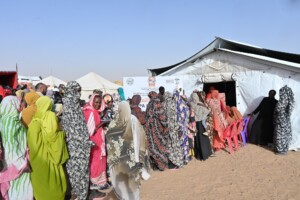Darfur displaced ‘categorically reject’ dismantling of camps
The Darfur Displaced and Refugees Association rejects the government’s plans to dismantle the camps for the displaced next year. They consider the situation much “too dangerous”.
The Darfur Displaced and Refugees Association has expressed its categorical rejection of the government’s plans to dismantle the camps for the displaced next year. They consider the situation much “too dangerous”.
On Monday, during his visit to Um Baru in North Darfur, Second Vice-President Hassabo Abdelrahman said that the government intends to put an end to the displacement before 2017.
He gave the displaced Darfuris two options: either to accept resettlement or return to their residents of origin. The government will support them in their choice which is to be implemented within 50 days.
In a meeting with political parties held earlier in the North Darfur capital of El Fasher, the VP called the camps for the displaced “a disgrace and an abuse of human rights and dignity”.
“If the government would have realised a comprehensive peace in Darfur and Sudan, the displaced would have returned to their villages already.”
Risk
The Darfur Displaced and Refugees Association described the plans to dismantle the camps as “a major risk” and a violation of international humanitarian laws and human rights charters.
Hussein Abu Sharati, the spokesman for the Association, told Radio Dabanga that there are no sufficient justifications for the dismantling of the camps.
“If the government would have realised a comprehensive peace in Darfur and Sudan, the displaced would have returned to their villages already – with the support from humanitarian organisations,” he said. “But we are still living in a war-like situation, with almost daily attacks by militiamen who kill, plunder, and rape with complete impunity.”
“The current situation in Darfur is much too dangerous for any return,” Abu Sharati added. “The entire region has been handed to militias. If the government cannot protect themselves in Darfur, how can it protect the people returning to their places of origin?”
He stressed that the displaced would very much want to return, “yet only after the militiamen have been disarmed, and a secure and stable situation has been realised”.











 and then
and then